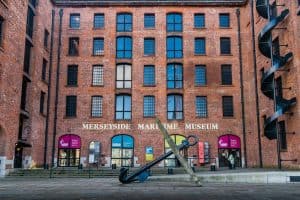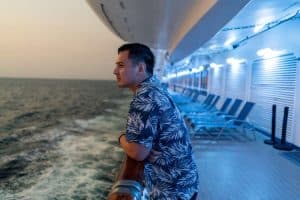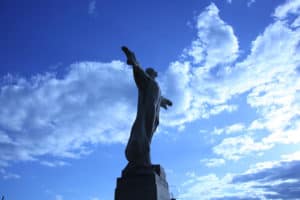The Indian Passenger. Not so much a conspiracy theory but more a ‘what if?’ scenario….Between passengers and crew there were nearly thirty nationalities on board the Titanic. Official lists tell us there were no travellers on board of true Indian heritage. Given that in 1912 the population of India was 315 million and that some of the top layers of Indian society were uber-rich it seems strange that no Indian person was on board. Fact – there were some passengers on RMS Titanic who were travelling under an assumed name. A good notion here for a fresh conspiracy theory.New facts about the Titanic do emerge from time to time and to fuel the not unreasonable idea that there could have been an Indian passenger, we’d like to introduce you to the story of Akram Maloof.
Maloof is a fictional character who plays a part in a novel being written by Titanic Echoes team member Mike Prince. This work-in-progress story is entitled Somewhere in the Suburbs. The central characters include Reginald Hill and Herbert Cope who own a once great company making locks, safes and bank vaults. To keep the company afloat when the business hits hard times, the partners turn to robbing banks so that they can save their livelihoods. Their knowledge of the inner workings of the new locks that have been developed to foil the criminal world serves them well, so much so that they become hooked on robbing the bad guys to do good deeds for the needy – well, after they’ve kept a premium for themselves.
Akram Maloof, travelling undercover as a Syrian, is a private investigator from Bombay (now Mumbai). He meets Reginald and Herbert on board Titanic and the three men are survivors.
A month later Akram, Reginald and Herbert meet in New York when he reveals his true identity. Akram’s real name is Raj Adarsh, and he’s tracking down a priceless Buddha that was stolen by British engineers. Now there are three partners as the new friends strike a deal that will lead to the return of many ancient treasures to India – that’s after a sensible commission is collected to cover expenses. This extract is seen from the point of view of Herbert’s son Bill…
CHAPTER SIX
The doomed voyage of the Titanic
It wasn’t until early July of 1912 that Uncle Reginald told mum and me about the night the Titanic went down into the icy ocean. Knowing that I was now to be treated as a grown-up member of the clan, he didn’t sanitise the telling of what happened. It was such a momentous event from my early life that I have a clear memory of how Dad’s partner filled us in on some of the details we hadn’t as yet known about. We were in the garden room at Three Oaks and before he began his monologue Reginald Hill coughed a little nervously. Remembering his style of delivery, it went something like this…
It was marvellous that Herbert and I could easily see you both along with my Rosamund and the girls waving from the quayside in Southampton as the great liner inched its way down the Solent towards the English Channel. After all the publicity and the newspaper stories about ‘the ship that couldn’t sink’, the crew and passengers forged as one community united in excitement. It was a magical experience and Herbert and I were so proud of the many parts of the Titanic that had been made in Birmingham and the Black Country. It felt as if we owned a part of the ship; a ship with splendour in first class, comparative luxury in lower classes and even in steerage the conditions excelled anything I’d seen before.
Henry, the steward in our first-class berth batted for the other side, if you know what I mean. I think he saw me as the reserved type and Herbert as somewhat outrageous in a comedic way. As my late father Elias Hill had taught me, tip well on the first day of a sea crossing to ensure good attention and then top it up or not when it’s time to disembark. In fact, we tipped very generously as we hoped for some intelligence gathering during the voyage and some contrived introductions if there were any useful fellow travelers to ‘bump’ into.
Now here’s an odd thing that we were inducted into by Henry. Apparently, in the trans-Atlantic passenger liners there was usually a dedicated space for the dead bodies of those being repatriated to their home countries. And, of course, the odd passenger is likely to kick the bucket during the voyage. These funeral parlours were usually in the bowels of the ship and often used by crew members as a secret drinking club.
On the Titanic a few crew members accessed the funeral parlour and called it The Stiff’s Club – I guess the double entendre was intended and not that original. It wasn’t unusual for a few passengers to get a special invitation to such clubs. Herbert had been making the stewards laugh from the moment we set sail from Southampton. Now it may seem odd to you but Henry invited us to call him Henrietta and he asked if he could call Herbert Margot – god knows why.
At what turned out to be our only visit to Stiffs there were four outrageously funny stewards and a couple of fellow passengers. We were introduced to a charming Syrian gentleman who was also great fun but, what a surprise, weeks later we discovered he was Indian and a private investigator from Bombay by the name of Raj Adarsh. I reckon there were a few passengers who were travelling under an assumed name. All these stories will come out eventually.
Herbert wanted to be centre stage for our second invitation to Stiffs and had got dressed up as a glamorous lady. It was easy to scrounge a few dresses and the like from Henrietta’s mates in the laundry. We were just about to go below to Stiffs when the bloody ship ploughed into the iceberg. Of course, that party down in Stiffs didn’t go ahead, but for a while people thought the alarm would soon be over. It was during that period of uncertainty and stoic calm that Ron Shingler, the senior steward for our row of suites, came in with an update on what was happening. By misfortune, Ron had with him one of the ship’s photographers who was planning to take some shots for the newspapers, chunks of ice on the decks and such like, assuming Captain Smith would soon signal the all clear.
Looking at Herbert, the senior steward and Henrietta’s boss said sarcastically, ‘very fetching, sir. Excellent attire if we do take to the lifeboats. As a lady, you’ll be first in line. Well done, sir’.
Seeing a possible grave misunderstanding, I protested, explaining that Herbert had been due to visit the Stiff’s Club and fancied dressing up a bit.
Of course, he would now change back into men’s clothing and await further instructions. The atmosphere then relaxed and stupidly Herbert and I agreed to something that I hope will never lead to any ramifications. The photographer asked if we’d like to buy a souvenir photograph. At this point there was no realisation of what would happen within the next few hours. So, with me wearing a dinner jacket, I cuddled up to Herbert and pretended to plant a kiss on his cheek – and the steward was right, Herbert looked fabulous in the dress and wrap and other accessories he’d borrowed. Thought I’d better mention this harmless prank we chaps got up to in case some opportunist came knocking at the door one day. All harmless nonsense, I promise.
I’ve read that at least one man did dress up as a woman to get into the lifeboats. Disgraceful behaviour. But a man dressed as a woman before the ship struck the iceberg and then changing back to be a man has to be a ‘one off’.
By the time Herbert had changed back into his dinner jacket, we were the last to leave our section of the first-class suites. There was water gushing down the corridors and doors were open including the Pattison stateroom which we had to pass, but there was no sign of the railroad millionaire and his wife. Doing the decent thing, we checked their rooms for valuables. The stateroom had its own safe made by Thomas Perry and Son of Bilston.
Now Perrys build a good safe but they don’t make their own locks. This safe had a lock made by guess who, the Nechells Safe Company. Within a minute or two Herbert had it open where we discovered some rather fine emerald bracelets and necklaces as well as a stunning tiara. We took along papers that were tied to the bundle of jewels and made our way up to the deck. They turned out to be the crown jewels of Princess Svetlana Pavlofna, an 18th century member of the Russian Royal family – but, of course, we didn’t know or care about such things at the time.
Later we learned the jewels had been stolen in St. Petersburg some sixty years ago and had ended up in the hands of a collector in Paris who, in turn, sold them secretly to the Pattisons. The naughty Pattisons. These famous jewels are still hot property and worth a fortune so no wonder they hadn’t been secured in the Purser’s safe. It’s also bizarre that the collection had never been broken down for an easier means of selling them on.
On the deck, we looked for the Pattisons but never found them. The childless couple who were multi-millionaires went down with the ship leaving no heirs who needed the cash that the jewels were worth.
For the next hour or so Herbert was magnificent in the way he dealt with the horrors we were all facing – the cold, the probable end of life, the separation of loved ones and the dramatic developments as the ship was breaking up. Herbert cajoled, hugged, showed optimism, sang along with the songs and hymns that the orchestra were gallantly playing and, when necessary, urged crew members to show more flexibility to some of their standing orders.
I did what I could to help but I freely admit I don’t have Herbert’s knack for putting people at ease, even when they’re facing impossible odds.
Herbert was a shining star that night whilst all the time wearing his heavy overcoat made all the more burdensome by Princess Svetlana’s jewels.
Of course, eventually we got spaces on one of the lifeboats. Incredible that not all the lifeboats were full; by George there are some tough questions still to answer as all the enquiries rumble on. No matter what they say, Titanic was an incredible feat of modern engineering. The view of that ship going down will haunt me for the rest of my life.
Enough from me, I’ll go up and see him now and make sure he’s following doctor’s orders. I know he’s been a tad quiet since we got back but the last two months in America has been exhausting and this pneumonia will soon get sorted out. I’m glad we had this little chat.
True enough, Dad had seemed shell-shocked when he returned from his first trip to America. He’d been ill with a stomach problem on the return voyage and the pneumonia set in shortly after he got back to Birmingham. He was unusually quiet and seemed somewhat depressed and then one day in August, like a light being switched on, he was back to his old self. It was then that I was shown the tunnel which became my regular haunt for studying the copious notes that were being kept on all the robberies. The do’s and don’ts of the safe-cracking trade with diagrams meticulously drawn by Uncle Reg. There were ledgers showing how the proceeds were being used. Notes on the donations being made to folk and companies in need. I read the minutes of the official meetings of the Nechells Safe Company, Cope Bicycles, Cope Tractors and a dozen or more other concerns.
There were also the unofficial minutes of the unspoken activities – although Dad was now sharing a great deal with me, my research in the tunnel filled me in with the detail he probably just didn’t have the time to talk to me about. Don’t ask me why, but all these incriminating papers, ledgers and many of the treasures are to this day still in the tunnel. Dad was a hoarder and I inherited his love of messing about in the tunnel, remembering the adrenalin rush of the journeys to our target bank or other locations for a robbery, the accomplices we worked with, the disguises we donned, and the scary moments when planning went pear-shaped.
As a boy, I read about the introductions to jewelers who were prepared to buy some parts of Princess Svetlana’s jewels; how that cash bought outright the safe-making business in Pittsburgh instead of a licensing deal which had been discussed in earlier correspondence. There was also cash left over to buy a struggling tool-making company in Detroit.
Another find in the tunnel was an account of a robbery in Louisville, Kentucky after a busy day on that city’s famous horse-racing track. Not so successful was a robbery in the university town of Princeton. The scheme of releasing a bag of live rats to cause chaos and allow Dad to spend time with the bank manager as a rodent infestation specialist failed miserably when the rats jumped out of the bag and disappeared in seconds with no one noticing them – slow the rats up by drugging them was the remedy in the debriefing notes for a further attempt at another bank in due course.
Important connections had been made in New York including fellow Titanic survivor and Stiffs guest, Raj Adarsh. Search any list of passengers who sailed on the Titanic and you won’t find a single man or woman of pure Indian heritage.
Raj had joined the liner posing as a Syrian and his undercover mission was to gather information about a British passenger in first-class who was allegedly involved in stealing a priceless centuries-old Buddha. It had been found when engineers were excavating the underground rooms of a derelict temple in the North East of India to make way for a railway track. Private Investigator Adarsh from Bombay decided to stay in America and, in time, became a key player in the growth of the Cope businesses.
We now had a business base in America. I kind of knew that one day I would spend a lot of time there.
Dad was fully recovered by Christmas and in the new year of 1913 four more robberies were executed with Dad explaining to me how all the intricate details were being rehearsed.
A year later I was asked if I’d like to play a small part in the first robbery of 1914. I listened in on many of the planning meetings. Inspired by the cash swilling in and around the Louisville race-track in America, the robbery was to be on a race-day at Uttoxeter in Staffordshire.
Uncle Reginald had heard that there’d been a spate of fixing going on involving some of the jockeys and the on-course bookies. There were also rumours of a protection racket involving gangs from Manchester, Birmingham and London. Dad and Reginald went on a reconnoiter and gathered that after the races there was usually a packed bar at The White Hart Hotel where some of the opportunist rascals worked out their deals and disbursements over many pints of beer. Whilst the negotiations were going on, the money was kept in the hotel safe located in the manager’s office.
It was here in Uttoxeter that the drugged rats caper was to be tested. Mum was to be in the main bar looking gorgeous and distracting the landlord and anyone who looked as if they were heading for the office. Reginald was to keep the receptionist busy with a series of complicated questions about a future booking. Dosey the First was, as always, playing his part; this time unloading a sack of sleepy rats by the steps that were close by the entrance to the bar. The idea being that confusion about the rats would block people going from the bar to reception, the main hotel entrance and the office at the back where Dad was hopefully going to crack the safe and discover a bounty of cash.
My task was to wait at the rear of the hotel where there was a row of stables and ensure our car, a borrowed Lanchester that would be hard to trace, didn’t get blocked in. There were three other motor cars in the yard including a beautiful Standard 6 cylinder 20 hp four-seater that was being protected by two smartly dressed boys with strong Birmingham accents.
The landlord’s son was showing off to the two Birmingham lads by telling them that he knew all the tricks that the jockeys used so that the bookmakers would know who was going to win the race; little signs with their riding crops signalling who was going to pull back and who would surge forward.
Then Willy who, I gathered, lived at the White Hart Hotel with his parents, asked the two car-minders how much the Standard motor had cost. ‘More money than you’ll ever see, you little brat. This car belongs to the Peaky Blinders and we don’t like inquisitive country bumpkins asking too many questions’.
It wasn’t long before Dad, Mum and Reginald strolled up to the car and told me about the dreadful plague of rats that had swarmed through the hotel with no apparent fear of the patrons. Mum claimed in a loud voice that she’d been close to fainting.
Dad cranked the car and the four of us, all sporting suitable disguises, climbed in for the journey back home. The robbery had been a great success and Dosey the First had gone off with the proceedings to a cheap boarding house in Ashbourne where he’d lie low for a few days before returning to Birmingham.
I felt so proud that I’d been a part of the team. I really had grown up.
‘That was a splendid horseless-carriage with the white-wall tyres’, said Uncle Reginald. That’s when I relayed the conversation between the three boys in the yard. When I mentioned the Peaky Blinders the grown-ups all went quiet and I noted anxious looks between Dad and his partner.
The older of those two dapper Birmingham lads would become my lifelong nemesis.
Watch out for further chapters from Somewhere in the Suburbs here on Titanic Echoes. As mentioned in the extract, we’ll learn that Raj stays in America. After a trip back to Europe using his fake Syrian identity of Akram Maloof, he later returns to America using his true Indian identity and becomes a US citizen. In time, his sleuthing skills become an important tool in the growth of an international conglomerate controlled by Herbert’s son Bill.
This work-in-progress book is fiction but we do have a gut feeling that there could well have been an Indian passenger on board Titanic. Any ideas or theories? If you do, please let us know.




